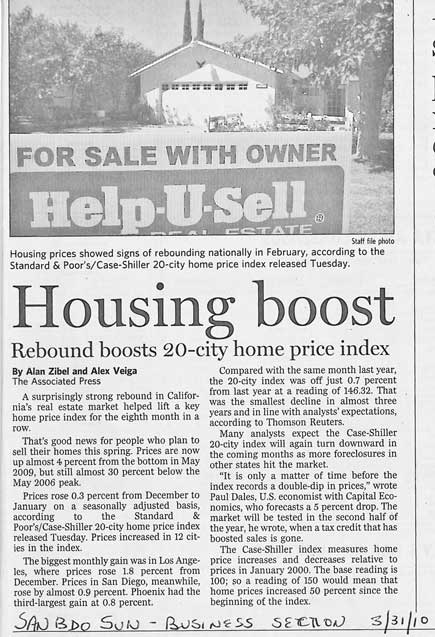Help-U-Sell Marketing was always intense and usually direct mail oriented. You carefully chose your 15,000 +/- households and then hit them over and over with ETMS and Brag Cards, Free Weekly Lists and Save Thousands ads. The price tag for all of this was large but the pay off (if you chose your target market wisely) was huge. I talked with a former franchisee last month who described his operation as a machine. He set up his marketing and hired an assistant whose job was to handle the in bound seller inquiries and book him five listing appointments a day. That’s all.
And it worked wonderfully . . . until the housing market began to unravel in late 2005.
Suddenly sellers were faced with declining values, a weakening economy, cutbacks, layoffs and a tightening credit. Buyers weren’t buying and sellers couldn’t sell. The power of that wonderful marketing machine faltered too. By 2007, you could spend thousands of dollars each month on marketing and get very little return. Offices that hadn’t worked buyers, who didn’t develop a client base, who never learned how to talk with an expired listing or a for sale by owner — in other words: the ones who had relied on marketing driven listings alone to generate revenue — began to fail.
At the same time, the survivors began to emerge. Sharp, scrappy and determined, these brokers had the guts to look at the new reality with new eyes. The realized that, just as the market had changed, so had the consumer. Those brave souls who ventured into the market were doing their homework and doing it online. Buyers were in control and spent months on the Internet, looking hat houses before they were ready to ink a deal. Putting two and two together, smart Help-U-Sell brokers realized that marketing to sellers was no longer efficient and went after buyers where the buyers were hanging out: the Internet. They invested in websites, search engine optimization, social networking, blogs and more.
They also went back to school. They remembered that every real estate transaction was about solving problems, a buyer’s problems and a seller’s problems. But the problems had changed dramatically from the days when five listing appointments a day could make you a star. Buyers were having difficulty getting financing and sellers were upside down. We had to learn mortgage lending to identify those buyers we could help and we had to learn short sales to minimize the damage to our sellers. Help-U-Sell brokers became navigators, pointing the way for buyers and sellers to make it through the new maze of market realities.
Direct mail marketing didn’t die — it just went on hiatus. We used the break to learn how to work with new tools to generate leads and, with perfect timing, new Help-U-Sell websites bloomed on the Internet.
Today, the real estate market is starting to wake up. I know this because investors are in an absolute feeding frenzy and have been for almost a year. Investors always set the bottom of the market — when they come out to play up ticks in activity and value are not far away. Just as the market improves, we also have to start ratcheting up our marketing. Brag cards are a great way to start — even if they are hung on doorknobs rather than delivered in mailboxes. A carefully targeted Penny Saver or super market mailer campaign might also make good sense. Remember: we survived the downturn by adapting. We changed the way we marketed. We will flourish in the upturn by doing the same thing.
The Internet was (and continues to be) all about reaching buyers. It’s time to start reaching sellers, too — and nobody knows how to do that better than we do.

